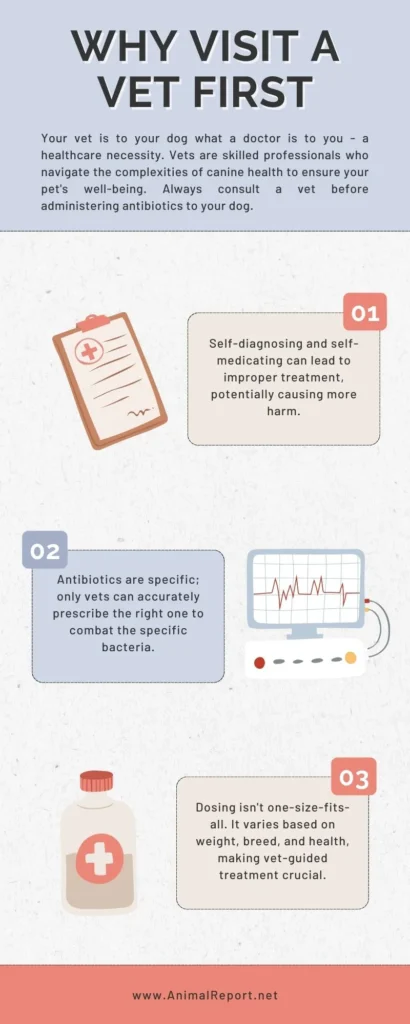You’re worried about your furry best friend. He’s been feeling under the weather, and the thought crosses your mind, “Can I get antibiotics for my dog without going to the vet?”
It’s not as straightforward as you might think, so let’s unpack this together, for the love and well-being of our canine companions.

Are Over-the-Counter Antibiotics Safe for Dogs?
This is a question that must be approached with caution.
The keyword here is ‘safe.’ Over-the-Counter (OTC) antibiotics, in theory, might treat certain infections in dogs. However, the potential risks and side effects can far outweigh any potential benefits.
Misuse of OTC antibiotics may lead to antibiotic resistance, a growing issue in veterinary medicine where bacteria become increasingly resistant, diminishing the effectiveness of these vital drugs.
Additionally, self-diagnosis and treatment could overlook the root of the problem, leading to the mismanagement of the true health issue. Not all infections require antibiotics, and incorrect usage could exacerbate the actual condition.
To ensure the safety and well-being of our four-legged friends, professional veterinary advice is key. They can provide appropriate diagnosis and treatment strategies, promoting optimal health outcomes for your dog.
Can You Get OTC Antibiotics Without Visiting a Vet?
Technically, yes, you can. There are places where you can get over-the-counter antibiotics for dogs. But just because you can, doesn’t mean you should.
Think about this. Would you take a medicine without a doctor’s recommendation? Probably not. Same goes for your dog. A vet’s advice is invaluable. They can correctly diagnose the issue and prescribe the right medication, with the correct dosage, for your dog.
This process reduces potential risks and ensures that your pet gets the best possible care. Your dog’s health isn’t something to take lightly, and a vet visit can go a long way in ensuring their well-being.
Can You Make Dog Antibiotics at Home?
Here’s where we tread very lightly, as the subject of homemade dog antibiotics is fraught with potential risks and misconceptions.
While we understand your desire to help your furry friend, the simple answer to this question is, no, you should not attempt to make antibiotics at home.
Antibiotics are sophisticated, scientifically formulated drugs. It requires precise knowledge and laboratory-grade conditions to develop them. Even the slightest miscalculation can lead to adverse effects, ineffective treatment, or worse, resistance to antibiotics in the future.
Remember, when it comes to medications, homemade is not synonymous with safe or effective.
While there are natural remedies that might help to boost your dog’s immune system, none of these can replace the direct action of antibiotics.
For example, honey has natural antimicrobial properties, but it’s nowhere near as effective as a prescribed antibiotic to fight off serious bacterial infections. Always consult your vet before trying out any home remedies on your dog. Their health deserves the best professional care.
Why Visit a Vet Before Giving Antibiotics?
Having a vet in your dog’s life is just as important as having a doctor in yours.
Vets are trained professionals who understand the intricacies of canine health. They use their knowledge and experience to guide us through our pet’s health journey, which is why a visit to the vet is crucial before administering antibiotics.
Let’s highlight a few reasons here. Firstly, self-diagnosing and self-medicating your dog can lead to incorrect treatment. What if it’s a viral infection, and you’re treating it with antibiotics, which only work on bacterial infections? You would be doing more harm than good.
Secondly, each antibiotic targets different types of bacteria. Only a vet can accurately determine which specific antibiotic is required, if at all. Giving the wrong antibiotic can lead to resistance, making future treatment difficult.
Lastly, dosages vary based on the dog’s weight, breed, and overall health. The one size fits all approach does not apply to antibiotics. Overdosing or underdosing can have serious consequences.
To help remember these essential points, we’ve made a straightforward infographic. It’s a clear reminder of why it’s vital to consult your vet before giving antibiotics to your dog:

In essence, the role of a vet in your dog’s life is paramount. They have the skills and knowledge to diagnose and treat your dog effectively and safely. You can visit the vet even without any papers. Trust in their expertise, just like your dog trusts in you.
Can You Treat Your Dog’s Infections Without Antibiotics?
Sometimes, an infection may seem severe to us but may actually be a natural process that the dog’s body can handle.
For minor issues, your vet may suggest waiting it out to see if your dog’s immune system can fight off the infection. In these cases, supportive care like proper nutrition, hydration, rest, and maintaining a stress-free environment can go a long way.
But remember, this does not mean ignoring signs of illness and should only be done under the guidance of a vet.
Now, let me share a personal experience. Once, my dog Sam seemed under the weather, showing symptoms like lethargy and loss of appetite. My first instinct was to run to the vet and get antibiotics, thinking it could be an infection. But upon consulting the vet, we found out it was a minor stomach upset, likely due to something he ate. With a few days of bland diet, plenty of water, and rest, he was back to his playful self. No antibiotics were needed.
I share this story to underscore the point:
While antibiotics are powerful tools, they are not always necessary. But this decision should always be made with the guidance of a professional veterinarian who can accurately diagnose and assess the severity of the condition.
Wrap-up: Key Points
Here’s a quick wrap-up of the blog post:
| Key Points | Details |
|---|---|
| Safety of OTC Antibiotics | Risks include antibiotic resistance and treatment mismanagement. |
| OTC Antibiotics without Vet Visit? | Possible, but not recommended. Vet advice ensures correct diagnosis and treatment. |
| Homemade Antibiotics? | No, these can’t be made safely or effectively at home. |
| Need for Vet Visit Before Antibiotics | Vets provide accurate diagnosis, correct medication and dosage, and prevent antibiotic resistance. |
| Treating Dog’s Infections Without Antibiotics | Possible under vet guidance, especially for minor issues that a dog’s immune system can handle. |
Ensuring your dog’s health doesn’t have to be complicated. There are many accessible and reliable vet services available. Look for local veterinary clinics, or explore telemedicine services like VetChat, VetNow, and Fuzzy Pet Health for professional advice right at your fingertips.
FAQs
What are potential risks of using human antibiotics for your dog?
Giving human antibiotics to dogs can lead to harmful side effects due to differences in human and dog metabolisms. Overdosing can cause severe conditions like kidney damage.
Why do some antibiotics require a prescription?
Certain antibiotics are potent and can have serious side effects if misused. Prescriptions ensure correct use, targeting the right bacteria, with the proper dosage and duration.
How to tell if my dog’s condition is serious enough to need antibiotics?
Persistent symptoms like loss of appetite, lethargy, and physical signs such as fever or swollen lymph nodes may indicate a serious condition. However, only a vet can accurately determine this.
Is it safe to use leftover antibiotics from a previous illness?
Using leftover antibiotics without vet consultation is unsafe. Treatment should be tailored to the infection and individual dog’s health. Misuse could lead to ineffective treatment and antibiotic resistance.
Alex, a passionate animal lover, has experience in training and understanding animal behavior. As a proud pet parent to two dogs and three cats, he founded AnimalReport.net to share insights from animal experts and expand his knowledge of the animal kingdom.




